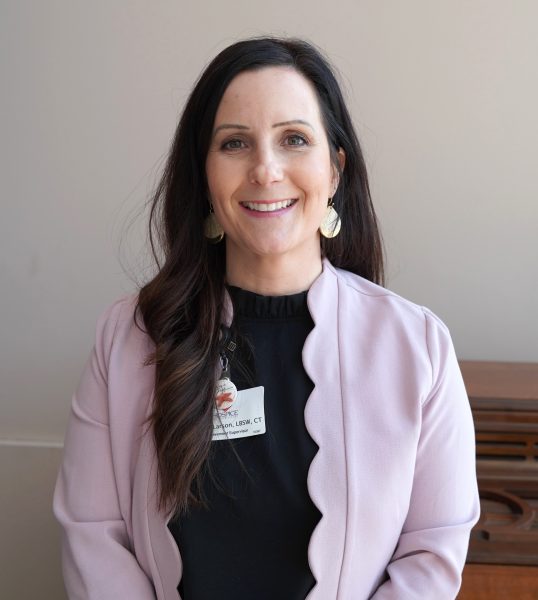by Heather Larson, Grief Specialist Supervisor

Often when we think of grief following the loss of a loved one, we think of the days, weeks, months and even the first few years following the loss. Most articles and books written on grief are for this earlier time frame. Grief support professionals often encourage and help their clients find ways to focus on the present, as looking too far ahead, can add stress and overwhelm them with what they are already experiencing.
While we encourage presence in the here and now, we also introduce the idea that grief is now a permanent part of us. That realistic and healthy outlook on grief includes the idea that we move forward versus move on with our grief.
There was a woman named Nora McInerny who lost a pregnancy, her husband and her father within a year. She has a great TED Talk titled We Don’t Move On From Our Grief. We Move Forward With It. The video can be found on YouTube. In watching Nora’s TED Talk, we are encouraged to recognize that grief is here to stay. It is forever a part of us, yet, as we continue 10, 20 plus years from when our loss occurred, there is less acknowledgment of the loss and fewer resources available to validate and support grievers. Nobody wants to remain in the dark trenches of grief for too long. Those who are more removed from the loss can walk away from those trenches more quickly, sometimes unrealistically expecting us to follow and do the same.
Most grievers who are years out will describe their day-to-day as significantly easier than it was in those initial days, weeks, months and even the first few years. They have learned and settled into a new sense of normalcy and on most days the pain felt when thinking of their loved ones isn’t as sharp as it once was. They have experienced several anniversaries, birthdays and other special days lessening the grip they hold on a person. So, does it get easier? Yes, it does!
But sometimes easier is mistaken for dissolution, which never happens with grief. Experienced grievers, while expressing having better days, also express feeling lonely in their grief at times. For some, each passing year may mean that fewer and fewer people remember those special anniversaries, birthdays and other important days. There may be fewer people attending special remembrance events or gatherings may no longer be planned. It may also mean that their loved one is spoken about less or in some situations, not at all. As the years pass, feelings of longing for and missing a loved one can further add to the loneliness felt in the later years of grieving. As with most grief reactions felt earlier on, there are times and phases when these feelings of longing may feel more intense than others. In the busyness of life, grievers may take less time to tend to their grief.
Tending to one’s grief can be one way of combatting these feelings of loneliness and longing for a loved one. How one tends to their grief as an individual is as unique as the individual experiencing it. Some suggestions may be spending time looking at old photos or special keepsakes and reminiscing. Journaling what life looks like now, accomplishments you would like to share, as well as times you are really missing this person’s presence in your life may be helpful. Doing something in honor of your loved one like volunteering can be a wonderful way to honor a special life. Sharing stories with younger generations creates a sense of legacy for the person and family which is a wonderful way to remember. Young children are often curious about their family heritage and have less difficulty talking about or saying a loved one’s name who has died, which can feel so good to us. This may also be a time to reflect on your spiritual needs and growth opportunities. Sometimes when we are not connected with our spirituality, we can tend to feel lonely or empty. Learning more about your spiritual self and what briefs bring you comfort and hope, can be powerful and healing. Honest communication about how you are doing and feeling in respect to your grief is always important in life no matter how long it’s been. It takes courage to be vulnerable and open about one’s grief – especially years later and know in doing so you might empower others to do the same.
No matter how long it’s been, finding or creating a connection to your loved ones can provide comfort and peace. Go to that favorite place, read the book and imagine their smile and that warm hug. Take heart that you are not alone. If we are living, we are grieving. Our grief evolves and does not hold the same spot it once did, but it is forever a part of us and who we are.




